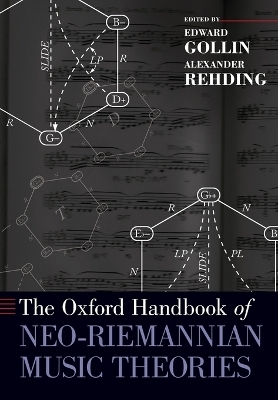
The Oxford Handbook of Neo-Riemannian Music Theories
Oxford University Press Inc (Verlag)
978-0-19-936783-2 (ISBN)
In recent years Hugo Riemann's ideas have thoroughly captured the music-theoretical imagination, both in the United States and abroad. Neo-Riemannian theory has proven particularly adept at explaining features of chromatic music where other theoretical approaches have failed, and in so doing has established itself as the leading theoretical approach of our time. The Oxford Handbook of Neo-Riemannian Music Theories brings together an international group of leading proponents of Riemannian and neo-Riemannian theory for a thoroughgoing exploration of the music-analytical, systematic, and historical aspects of this important new field. The volume elucidates key aspects of the field, draws connections between Riemann's original ideas and current thought, and suggests new applications and avenues for further study. A number of essays suggest connections to other fields of inquiry, such as cognitive and mathematical music theory, as well as applications in the field of metric or melodic analysis. The selection of essays is complemented by several of Hugo Riemann's key original texts, many of which appear in English translation for the first time, and is rounded off by a glossary of key concepts for easy reference.
Edward Gollin is Associate Professor of Music at Williams College. Alexander Rehding teaches music at Harvard University. His interests are in the history of music theory, and in nineteenth and twentieth century music. He is the author of Hugo Riemann and the Birth of Modern Musical Thought and Music and Monumentality, and is co-editor of Acta musicologica.
Acknowledgments ; Preface ; Part I. Intellectual Contexts ; Chapter 1. The Reception of Hugo Riemann's Music Theory ; Ludwig Holtmeier ; Chapter 2. The Nature of Harmony: A Translation and Commentary ; Benjamin Steege ; Chapter 3. What is a Function? ; Brian Hyer ; Chapter 4. Riemann and Melodic Analysis: Studies in Folk-Musical Tonality ; Matthew Gelbart and Alexander Rehding ; Part II. Dualism ; Chapter 5. The Problem of Harmonic Dualism: A Translation and Commentary ; Ian Bent ; Chapter 6. Harmonic Dualism as Historical and Structural Imperative ; Henry Klumpenhouwer ; Chapter 7. Dualistic Forms ; Alexander Rehding ; Chapter 8. Dualism and the Beholder's Eye: Inversional Symmetry in Chromatic Tonal Music ; Dmitri Tymoczko ; Part III. Tone Space ; Chapter 9. From Matrix to Map: Tonbestimmung, the Tonnetz, and Riemann's Combinatorial Conception of Interval ; Edward Gollin ; Chapter 10. On the Imagination of Tone in Schubert's Liedesend (D473), Trost (D523), and Gretchens Bitte (D564) ; Suzannah Clark ; Chapter 11. Tonal Pitch Space and the (neo-) Riemannian Tonnetz ; Richard Cohn ; Part IV. Harmonic Space ; Chapter 12. Neo-Riemannian Perspectives on the Harmonieschritte, with a Translation of Riemann's Systematik der Harmonieschritte ; Nora Engebretsen ; Chapter 13. On a Transformational Curiosity in Riemann's Schematisirung der Dissonanzen ; Edward Gollin ; Chapter 14. Chromaticism and the Question of Tonality ; David Kopp ; Part V. Temporal Space ; Chapter 15. Perspectives on Riemann's Mature Theory of Meter ; William E. Caplin ; Chapter 16. Reading Between the Lines: Hugo Riemann and Beethoven's Op. 31 Piano Sonatas ; Scott Burnham ; Chapter 17. Metric Freedoms in Brahms's Songs: A Translation and Commentary ; Paul Berry ; Part VI. Transformation, Analysis, Criticism ; Chapter 18. Riemannian Analytical Values, Paleo- and Neo- ; Steven Rings ; Chapter 19. Tonal Interpretation, Transformational Models, and the Chromatic Calls to Repent in Franck's Le chasseur maudit ; Robert C. Cook ; Chapter 20. Three Short Essays on Neo-Riemannian Theory ; Daniel Harrison ; Glossary ; Selected Bibliography ; Index
| Erscheint lt. Verlag | 19.6.2014 |
|---|---|
| Reihe/Serie | Oxford Handbooks |
| Zusatzinfo | 30 line illus.; 140 music examples |
| Verlagsort | New York |
| Sprache | englisch |
| Maße | 170 x 244 mm |
| Gewicht | 1089 g |
| Themenwelt | Kunst / Musik / Theater ► Musik ► Musiktheorie / Musiklehre |
| ISBN-10 | 0-19-936783-3 / 0199367833 |
| ISBN-13 | 978-0-19-936783-2 / 9780199367832 |
| Zustand | Neuware |
| Haben Sie eine Frage zum Produkt? |
aus dem Bereich


